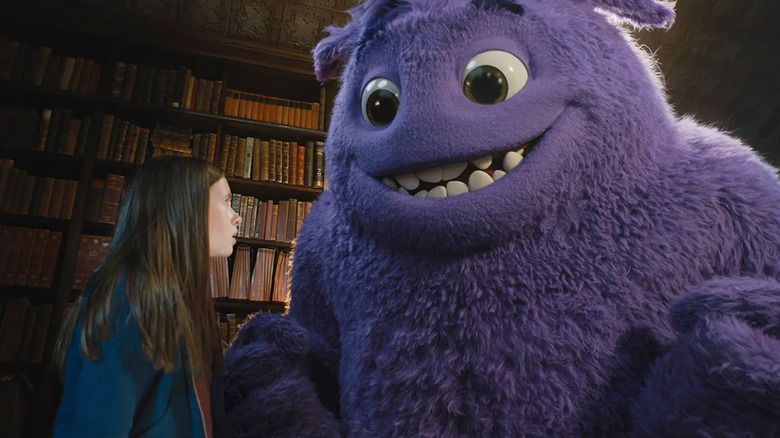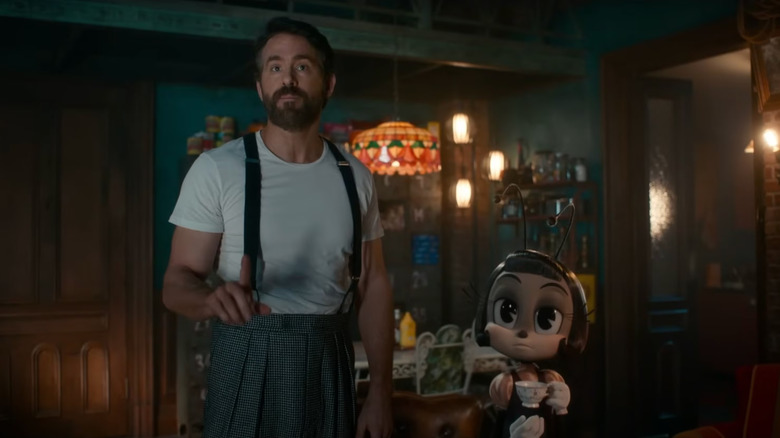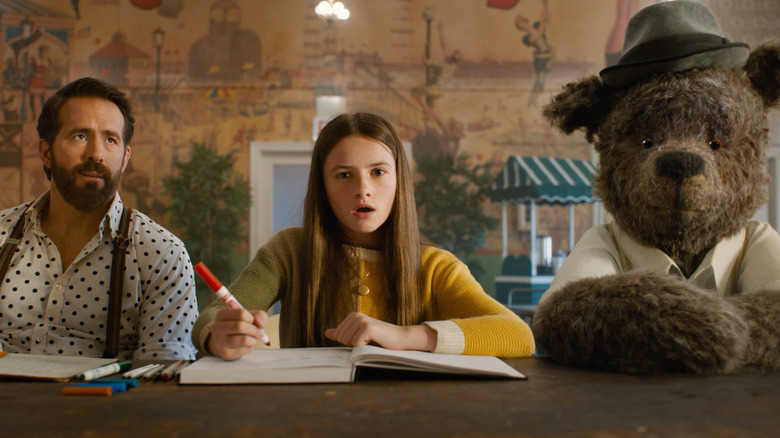IF Review: These Imaginary Friends Should Have Stayed In John Krasinski's Head
- Janusz Kamiński's cinematography is inventive in ways the narrative itself is not
- This film about a child's imagination deeply lacks any of its own
- Desperately wants to make you cry without trying to make you care about the characters
- Every narrative beat is lifted from better movies that you'll wish you were watching instead
The trailer for "IF" boasts that the family-friendly fantasy is beamed directly from "the imagination of John Krasinski." If that's the case, then nobody could accuse him of having a particularly distinctive creative mind. His film is filled with half-remembered plot beats from earlier, better movies, ranging from "E.T" — undoubtedly his biggest touchstone here — to a film with one of the most famous plot twists of all time, borrowed so shamelessly and telegraphed so blatantly I spent much of the movie assuming he wasn't going to insult his audience's intelligence by pulling the same trick. It's a movie about the boundless imagination of children that could only have been made by a cynical adult mind, careful to restrict itself from attempting anything bold so it can algorithmically copy everything that has worked throughout decades of Amblin classics, albeit devoid of genuine heart or charm.
IF can't capture the mayhem of a child's imagination
Twelve-year-old Bea (Cailey Fleming) is living with her grandmother, Margaret (Fiona Shaw), following the death of her mother and amidst her prankster father's (John Krasinski) ongoing treatment for a nonspecific life-threatening illness. One day, just outside the New York brownstone where she lives, she spots a strange creature running into her building and into an abandoned apartment directly above hers. Not long after, she discovers that this room is occupied by Cal (Ryan Reynolds), who shares the same gift as her: they can both see the IFs — the SEO-unfriendly term for imaginary friends the movie is desperate to make happen — who have been abandoned by the children who have grown out of them. With all of these cuddly creations (led by Steve Carell's deeply annoying Blue) burdening them both, the pair teams up in the hope of matching the imaginary friends with new owners, which is easier said than done.
The plethora of imaginary friends live undetected next to Luna Park in Coney Island, the most imaginatively realized set within a film that largely takes place within dull or sterile interiors — several identical apartment buildings and hospital wards take up most of the screen time — which even the least discerning child will likely recognize as being shot on sound stages. If the limited nature of the locations within the story aren't testament enough to the shortcomings of Krasinski's imagination, then the sequence in which he finally lets his young protagonist's mind run free and completely transform the home for IFs, Elliot Page in "Inception"-style, articulates it most clearly. Yassifying the colder but significantly more striking imagery from Christopher Nolan's blockbuster, corridors fold into themselves and walls collapse outward as the home's interiors give way to swimming pools, beaches, and concert stages.
Thanks to Steven Spielberg's go-to cinematographer, Janusz Kamiński, there is occasionally striking imagery, such as Reynolds climbing out of a watercolor painting, but nothing that feels like it could have come from a young, hyperactive imagination. This sequence builds, bizarrely, towards Reynolds getting deep-faked into the music video for Tina Turner's 1984 hit "Better Be Good To Me" as a member of her backing band, a curious decision when framed as the product of a young child's mind. Does Krasinski not know the kids are listening to Olivia Rodrigo these days? This might sound like I'm clutching at straws, but there's no foreshadowing to this specific needle drop, nor are there any events within the narrative that mirror the lyrics in any way. It feels like the product of a director thinking more about what songs he'd like to hear in a movie than an accurate reflection of something his young protagonist would have as the soundtrack to her craziest fantasies.
Throughout, I kept thinking back to a criticism that was frequently levied at "Inception" when it premiered: that the dreams presented within weren't surreal enough, showing a lack of imagination on Nolan's behalf. I understand that line of thinking, but find it fairly easy to disagree with because "Inception" is, fundamentally, a heist movie — it has to conform to a more straightforward narrative logic in order for its beats to thrill as intended. "IF" doesn't have similar constraints placed upon itself, and it takes great pains to reference the impracticalities of various imaginary friends (including invisible ones, or ones whose size causes untold destruction around them) in ways that could lead to joyous controlled chaos if utilized properly.
It really, really, really wants you to cry
John Krasinski isn't a bold enough writer or director to let his creations run amok, with most of them confined to cameos with no more than two lines of dialogue — don't be fooled by the posters trumpeting an all-star cast! — hurrying quickly past what should be the comedy set pieces straight to a cloying sentimentality unashamedly aimed more at the parents than their likely bored kids. As well as the Steven Spielbergian family fantasies of the 1980s, I suspect "Pixar" was scrawled on Krasinski's vision board for the movie, somewhere above "WHAT IS THE WEAKNESS," as it feels desperate to emulate the studio's knack for marrying high concept race-against-time narratives with outlandish characters and tear-jerking emotion. But reducing storytelling to a formula leaves it without heart, and despite his status as a former sitcom star, the writer-director can't even pen any jokes good enough to distract from this cynicism.
The fact we don't get into the specifics of Bea's father's illness, for example, isn't an issue. "My Neighbor Totoro" manages to ground a fantastical story within the realities of two young children with a parent in the hospital without dwelling on the harsh truths behind their circumstances, largely because it's attuned to telling a story from a distinctly childlike perspective. From the opening sequences of "IF," when Michael Giacchino's score quickly swells into a shameless impersonation of a John Williams emotion-stirrer as we see a childhood montage that ends with a parent's terminal illness, Krasinski wants to bypass character introduction and development to try to make audiences cry.
Terminal illness is frequently utilized by the writer-director in cynical ways — it was previously invoked to add depth to the family drama in his largely ignored 2016 dramedy "The Hollars." In "IF," its deliberately vague invocation feels like a cheap ploy to get audiences to read their own experiences into the film and do the emotional work for him. As Krasinski's character plays practical jokes around his hospital ward to try and keep his visiting daughter amused and distracted from the realities of his condition, the movie strays close to the deeply unfashionable territory occupied by slapstick weepies such as "Patch Adams" and "Life Is Beautiful." Whisper it, but a movie that leaned further into that unashamedly mawkish territory might have worked better than this one. It would at the very least be slightly more satisfying than a filmmaker aiming for the lofty heights of Spielberg and failing spectacularly.
"IF" arrives in movie theaters on May 17.


